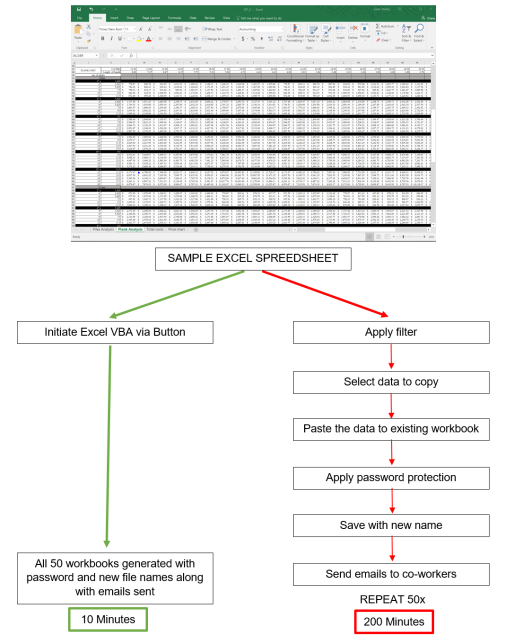Often, people view Microsoft Excel as a business tool or a means for tracking their personal finances. However, any engineer in the work force will attest to the fact that Excel is one of, if not the most useful software packages available. Being in the workforce for over a year, I can safely say that I spend 50-60% of my screen time on a computer with an Excel window open! Not only can Excel be utilized for data storage and number crunching, but it can be modified to perform a wide variety of engineering tasks and complex numerical analysis if you know the ins and outs of the program.
What makes excel such a useful tool for an engineer is the following 3 reasons:
Saves Time
As a member of an industrial air moving company if there is one thing I have learned about the company is they live, eat, and breath spreadsheets. I have also observed that the engineers who end up working longer hours are the ones who do not know how to use Excel to its fullest potential. Coincidence? I think not.
Sure, some of my peers may be more experienced in the field and can do it analytically without a problem on pencil and paper; however, when it comes to taking the complex formulas and making it repeatable on Excel their productivity plummets. Thus, they usually end up calling me, a CO-OP, with a question simply because they lack the intuitive sense to set up formulas and use the built-in functions in the program. So, do yourself a favor and learn Excel as best you can – your friends and family will be grateful when you get home at a reasonable hour from work.
It is a Common Language
Other than saving you time, Excel is used by practically everyone at some point. Whether they know how to use it effectively was already addressed, but nonetheless, Excel is so prevalent it is being taught to my second-grade nephew! Seldom will you find someone who does not have a novice understanding of the program’s functionality and that is what makes it so great.
Hence, Excel is a great communication tool not only between engineers, but between anyone in any field. With Excel, engineers have the unique capability to communicate not only with themselves but with other professions as well.
Some examples where I have used Excel to communicate are:
- Sending calculations and data analysis to another firm.
- Projecting project costs to a senior accountant.
- Conveying dimensions and part tolerances to a shop technician.
The list goes on and on, but the point is that in knowing Excel as an engineer you become an effective communicator. Moreover, the better you know the program, the more effectively you can convey data, graphs, analysis, etc. and the more marketable you become as an employee.
Yet another benefit of Excel being a universal language is the resources available to learn and improve techniques are extensive. There is a myriad of free tutorials on the internet available via a simple Google or YouTube search. Furthermore, there are many online forums at your disposal that allow you to post certain questions. My personal favorite is Excelforum.com. I primarily go there when I am asking a very specific question because it is likely someone else has already answered the question for you.
The VBA Coding
Perhaps the best kept secret of Excel is the VBA (Visual Basic for Applications) coding that is available on every download of Excel. The increase in productivity and accuracy are enormous and it practically doubles Excel’s capabilities if you learn the coding language.
VBA offers the unique capability of taking tasks you preform manually such as copy and paste, calculations, saving, locking sheets, analysis, etc. and does it in 1% of the time. If you do not believe me, check out the graphic below demonstrating how VBA can save you time.

Moreover, if you write the code correctly, it eliminates the possibility of human error, a costly mistake in the engineering field. Also with VBA, you can write the code to send emails to co-workers if an analysis is complete or you can program the spreadsheet to run complex mathematical functions that otherwise would be too complicated to place in a cell normally.
Overall, there is no real downside in not knowing Excel. In fact, it is a basic requirement to know spreadsheet software such as Excel to be hired for any position within the field. After all, who wants to work long hours doing hand calculations when this time-saving tool is readily available on any computer world wide?

